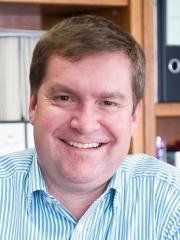Professor Morrison Euan Wallace AM

Researcher biography
Professor Euan Wallace is a Chief Investigator on the CRE and Co-Chair of the Pre-clinical & Neuroprotection Theme
From bedside to lab to bedside - research that gives hope to desperate mums
Professor Euan Wallace is a hero to expectant mums at risk of losing a baby or giving birth to a child with cerebral palsy or organ damage. The director of the Ritchie Centre and his multidisciplinary team seek - and often find - new ways to treat at-risk mothers and babies, including with antioxidants to minimise and stems cells to repair serious tissue damage.
As an obstetrician who treats the most at-risk pregnancies in Victoria, Euan is particularly excited by his research team's latest promising treatment, which could reduce brain and lung damage in stressed fetuses.
It's now ready for clinical trials, having proved successful in laboratory modelling. It involves introducing antioxidants into the womb via the mother to treat a lack of oxygen in stressed fetuses.
These fetuses often end up with too many oxygen free radicals, which can damage their brains and other organs and cause cerebral palsy - a disability that often only shows up when parents wonder why their child can't crawl or walk like other babies of the same age.
The new treatment can also be used directly on babies, starved of oxygen at birth. It's the kind of clinical problem solving at which the Ritchie Centre excels.
'We start with a clinical problem in our wards, develop experimental models to mimic it, unpick the pathways along which it occurs, develop treatments and bring them back to the clinic - a bedside-to-bench-to-bedside approach that is one of our strengths.' he says.
The Ritchie Centre sits within the Monash Institute of Medical Research and is based at the Monash Medical Centre, the teaching hospital linked to Monash University.
It brings together basic scientists, medical researchers, doctors, nurses, as well as sociologists and even engineers to solve problems that perinatal medical staff - who treat mothers and babies before, during and after birth - face every day.
One of the group's biggest challenges is intrauterine growth restriction, where a fetus grows slowly or not at all. It occurs in about one in 20 pregnancies, and although it is not always a serious problem, when it is it can trigger the damaging cycle of inadequate oxygen.
Seven out of 10 cases of cerebral palsy have their origins in such an event in the womb rather than at birth because, as Euan says, 'the placenta is not plugged in properly'.
'We need to take the baby as far as we can in the pregnancy to give it its best prospects for survival. But at the same time, we need to acknowledge that injury is going on and these babies have a 10-fold increased risk of cerebral palsy in years to come.'
This delicate balancing act of trying to prolong a difficult pregnancy, care for a stressed fetus and act when birth is necessary, is at the heart of much of Euan's work.
But advances in obstetrics can create new problems, requiring new solutions. For example, babies born at just 24 weeks can survive now, unlike 30 years ago, but face a lifetime of chronic lung disease, which can worsen with age.
'These are children who we expect to have really bad lung disease in their 40s and 50s,' Euan says. 'But we can't be sure how bad because we don't have any adults, born at 24 weeks, aged 40 yet.'
The desire to repair organs damaged in the womb or at birth has led to another promising treatment, which uses stem cells from the amniotic sac within the placenta.
Amniotic stem cells are special because, unlike stem cells taken from embryos, they are simply collected from placentas that will be discarded anyway. They also don't carry the risk of producing tumours and, potentially, can be transplanted into any human being to repair damaged organs, not just the one they came from.
Research into their use is in its early stages at the Ritchie Centre but gives hope that we might soon be able to repair the damaged lungs of a very premature baby or the brain of a stressed fetus at risk of cerebral palsy.
While Euan and his team are heroes to many anxious parents, he sees them as the real fighters.
'The drive and emotions underlying having children are fundamental and powerful. It's a genuine privilege to be able to provide care for these families - to see the challenges that mothers and babies face, come back to the laboratory and our scientists and say, 'These are the issues, let's cure them.''
